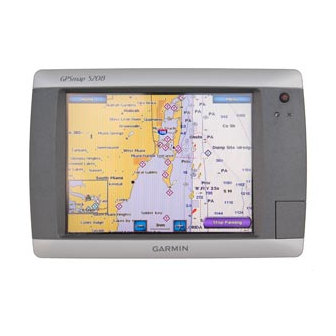NMEA 2000-Certified Sensor Configuration Information
Configuring Engine and Tank Information
If you have a multi-engine or a multi-tank setup on your boat, specify which engine or tank is associated with each GFS 10.
tiP: The serial number of each GFS 10 is shown on the NMEA 2000 device configuration menu to help differentiate among multiple GFS 10 devices.
To configure tank and engine information for the GFS 10:
1. While viewing the NMEA 2000 device configuration menu, select the GFS 10 device you want to configure, and select Config.
2. Select from the following options:
•
Engine
Number—for a multi-engine installation, assign the selected GFS 10 to a specific engine.
•
Tank
Number—for a multi-tank installation, assign the selected GFS 10 to a specific tank.
•
Tank
Capacity—define the fuel capacity of the fuel tank that the selected GFS 10 is connected to.
Troubleshooting Fuel Gauge Type
When wired to a fuel gauge, the gauge type defaults to Auto Detect. If the fuel-level reading on your Garmin chartplotter or marine instrument
changes with the engine RPM, the GFS 10 could be detecting the wrong type of gauge.
Note: The fuel level changes with the motion of the boat. Perform this test when the boat is not moving.
To test the gauge-type setting:
1. When the boat is not moving, put the engine in neutral.
2. Use the throttle to increase the engine RPM. If the fuel-level reading changes with the engine RPM, change the gauge type.
To change the gauge-type setting:
1. While viewing the NMEA 2000 device configuration menu, select the GFS 10 device.
2. Select
Config
>
Gauge
Type.
3. Choose
1 Coil
or
2 Coil
Troubleshooting the Fuel-Flow Rate
If the fuel-flow information received from the GFS 10 appears inaccurate, you can manually adjust the fuel-flow reading.
To adjust the fuel-flow rate:
1. While viewing the NMEA 2000 device configuration menu, select the GFS 10 device.
2. Select
Config
>
Flow
Adjustment.
3. Enter a positive or negative adjustment.
For example, when you set the Flow Adjustment to +10% , a flow reading of 20 gal./hr. (75 L/h) would change to a reading of 22 gal./hr.
(82.5 L/h), because 20 gal. × 110% = 22 gal. (75 L × 110% = 82.5 L).
Restoring Factory Default Settings
You can restore factory default settings to the GFS 10. You will lose all custom configuration and calibration settings when you restore factory
default settings.
To restore factory default settings:
1. While viewing the NMEA 2000 configuration menu, select the GFS 10 device.
2. Select
Config
>
Factory
20
and repeat the gauge-type setting test.
Defaults.
Technical Reference for Garmin NMEA 2000 Products

